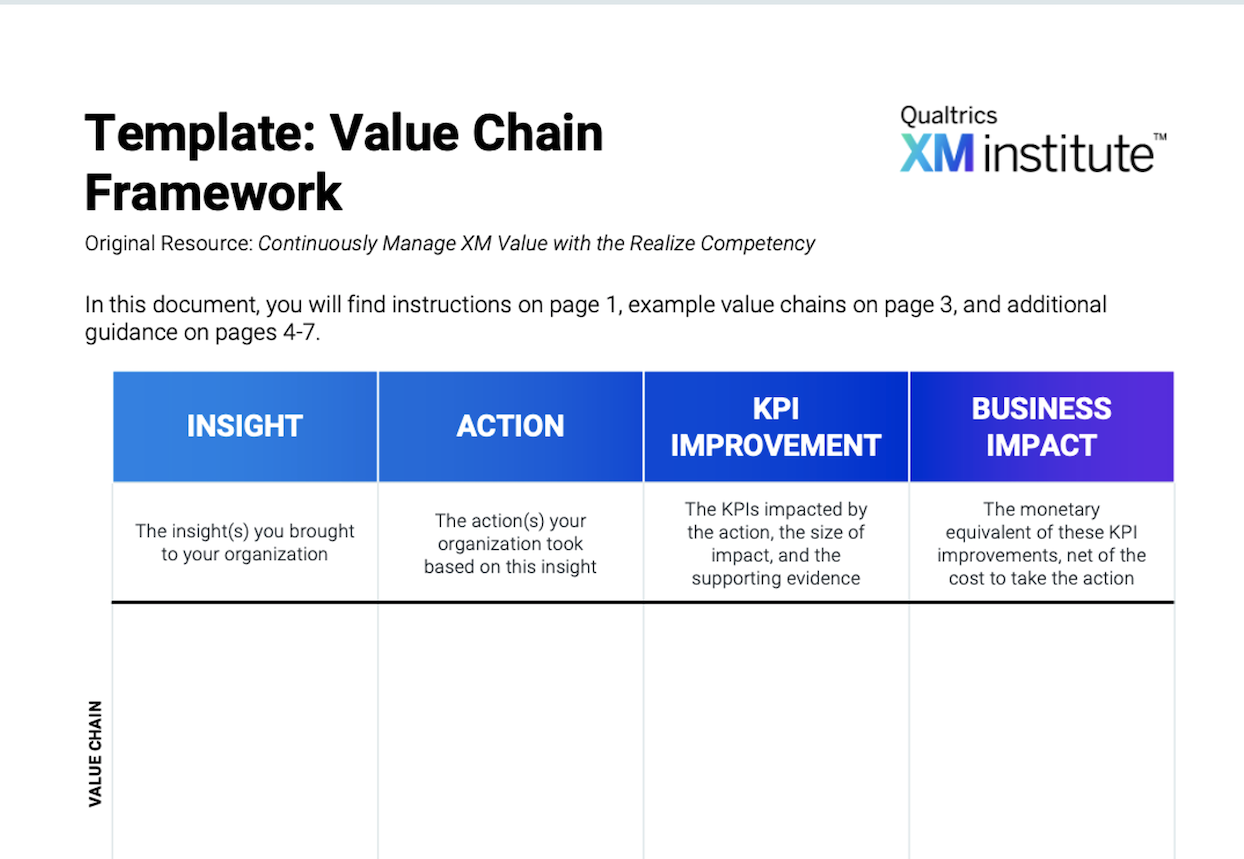Throughout the previous year, XM Institute faculty have had the opportunity to research and observe the trends, best practices, successes, and struggles of organizations around the world. Based on this unique vantage point, each of the XM Catalysts is sharing their thoughts about 2023.
Key Takeaways From 2023
XM Institute faculty share three key takeaways from last year.
Moira Dorsey
Moira’s three key takeaways from 2023:
- Journeys are taking center stage in experience management. One of the key concepts for every XM program is journeys, the paths that people take to accomplish their goals. When you say ‘journeys,’ however, many people think only of journey mapping. While it’s valuable to periodically map people’s experience pathways, that activity represents just a small aspect of what we call Journey-Centric Experience Management, which we define as an approach for aligning resources around the moments across journeys that drive the most value for an organization. We expect to see more organizations put journeys at the center of their XM efforts. For example, we’ve seen XM leaders use journeys as the foundation of efforts to propel XM-centric culture and to build a system of insights to action workflows.
- Relationship-building is an under-appreciated skill. A topic that community members brought up several times at XM Pros Virtual Meetups in 2023 was the importance of investing time in relationship-building. This is, of course, an important dependency for the success of every XM program. Customers, employees, and partners traverse various parts of an organization that deliver – and impact the effectiveness of – the experiences they have. As a result, improving experiences depends on buy-in and resources from multiple functions. That level of collaboration and contribution depends upon strong foundational relationships with stakeholders. Community members shared additional reasons why investing time in relationships is so important. One XM leader shared a story about a supporter who proactively recommended them for a promotion. Another XM Leader shared how advocates supported them at critical moments by helping them rehearse for their first-ever XM presentation to the board of directors.
- Our research tracked a number of key XM trends. XM Institute is on a mission to help XM Professionals succeed through our training, XM Pros community, and our XM Library of content. In addition to best practices research, we also do quantitative studies with consumers, employees, and practitioners to keep a pulse on key trends in the XM landscape. In 2023 our studies included 140,000 respondents in dozens of countries. We published a ton of valuable data across 29 pieces of content. Our latest Infographic: Top Factoids of 2023 has a great sampling of a few key data points. You’ll find more like those in our Data Snippets. For example, the 41%-point gap between HR leaders’ and employees’ perception of feedback use. And for more comprehensive data cuts with detailed looks into things like CX Leaders’ stronger likelihood to report that their CX program has significantly improved business outcomes than companies with less mature CX capabilities take a look at our Data Snapshot research reports.
Cecelia Herbert
Cecelia’s three key takeaways from 2023:
- The opportunity in front of us. Tapping diverse voices is widely acknowledged as the key to addressing complex challenges and igniting innovation. And boy did 2023 crank up the complexity dial! The case for large-scale listening to employees, customers, and communities, and leveraging those insights for better decision-making, is rock-solid. Yet realizing this aspiration has felt just beyond our grasp for so long…However, 2023 ends with a different feeling. HR/EX and CX professionals are increasingly steering strategic initiatives that strengthen organizational agility. By applying the discipline of XM and embracing rapid technological advancements, they’re making continuous listening and real-time insight distribution a tangible reality. Witnessing breakthroughs in data integration, AI adoption, embedded people science, and demonstrating the value of XM is exhilarating. We’re on the brink of unlocking dormant human experience insights that hold the key to organizational success. Exciting times, indeed.
- The importance of human connection. In all of the research and conversations that we have been part of this year, we are reminded that people still treasure human connection. The more complex or unique our situation is, the greater the desire for an empathic person to be there with us to resolve it. Our biggest concerns about the use of AI technology appear to be centered on the fear of losing human connection or judgment. As we look to the future use of these technologies, we must find opportunities to enhance human connection, rather than replace it. Using these tools to take the load off routine or time-consuming tasks, or to provide timely and relevant insights that are otherwise unavailable can open up opportunities to create more personalised human experiences.
- The power of asking questions. Experience management (XM) has surged to the forefront of business transformation over the past few years, reshaping our collective understanding of effective leadership. In past times of uncertainty, we sought answers from leaders. Today, amid exponential uncertainty, rapid disruption, and heightened social awareness, leaders are expected to pose the right questions. They must be curious about diverse experiences, explore contrary ideas, care about their impact, and take accountability when intentions fall short. While adaptive and empathetic leadership has long been recognised as essential, nurturing these skills and connecting them to tangible business outcomes has proven elusive. 2023 has seen XM professionals leading the charge, reframing these “soft skills” as “hard skills” and building the operational foundations to solidify these cultural shifts. Going into the new year, there is real optimism about human-centric cultures being the differentiator for sustainable success, and with it, a new style of leadership being curated. As Dame Jacinda Ardern articulated “One of the criticisms I’ve faced over the years is that I’m not aggressive enough or assertive enough, or maybe somehow, because I’m empathetic, it means I’m weak. I totally rebel against that. I refuse to believe that you cannot be both compassionate and strong.”
James Scutt
James’ three key takeaways from 2023:
- Many are revisiting the basics. Many organisations are making a strategic shift by decreasing their dependence on external contractors who have traditionally managed their experience management (XM) programmes. This change is leading these organisations to build and strengthen their own in-house teams dedicated to XM. Consequently, this move has brought to light the importance of understanding the fundamental principles of experience management. Organisations taking XM under their wing are looking to invest in training and developing the skills of employees. The move to have direct control over XM strategies brings high potential to improve efficiency and drive down costs associated with outsourcing.
- Articulating the value of an XM programme is a high priority. The importance of clearly communicating the benefits of an Experience Management programme is increasingly being recognised by organisations. With businesses examining their expenditures with greater attention, XM teams need to demonstrate how they contribute to their organisations success. Identifying, defining, and expanding the realisation of the specific value XM initiatives play back into an organisation is becoming a key activity for XM teams. Likewise, wider business teams must align to leverage these advantages and translate them into tangible outcomes, such as higher sales or reduced employee turnover. As a result, XM teams are now prioritising the need to quantify their impact on the business, ensuring that the value they provide is understood and appreciated by senior management.
- Organisations are becoming less reliant on traditional surveys. A growing number of organisations are moving beyond their reliance on traditional surveys to gather customer feedback. Technological advancements have opened up new avenues, enabling organisations to listen to their customers across a variety of channels. As a result, companies no longer need to rely solely on surveys to understand customer opinions and experiences. This shift is alleviating the burden that customers often feel when they are frequently asked to complete surveys. Customers can now provide feedback in a way that is convenient for them, leading to more authentic and valuable insights for organisations.
Bruce Temkin
Bruce’s three key takeaways from 2023:
- Change is THE XM storyline. As I’ve traveled around the world speaking at events and leading masterclasses throughout 2023, the one thing that keeps coming is the struggle that organizations face in establishing new post-COVID norms and figuring out how to operate in an extremely uncertain environment. This includes shifting demands in everything from customer-facing strategies to the future of work for their employees. While this can put pressure on XM teams in the short term as companies question all areas of discretionary investments, it represents a great opportunity for XM professionals to demonstrate their value. To succeed through uncertainty, organizations need to make faster, more informed decisions – which is exactly what XM is all about. So XM professionals need to showcase how XM helps build agility.
- Gen AI made its grand appearance. How can we recap 2023 without acknowledging the arrival of Gen AI? You can’t seem to go anywhere without someone mentioning it as either the future of everything or the demise of the human race. Of course, it’s neither of those things. We believe that Gen AI will be less impactful than hyped in the short run, yet it will be more transformational than expected in the long run. We recommend that XM pros make plans to leverage four key capabilities of Gen AI: Data summarization, pattern recognition, conversational interface, and content personalization.
- Analytics turned to conversations. We found a growing number of organizations using Qualtrics customer care capabilities to mine actionable insights from their contact centers. I can’t think of a more powerful source of data than conversations with customers who are sharing their stories. As companies tap into conversational analytics, we find that they open up a wide range of opportunities to totally transform their contact centers.
Isabelle Zdatny
Isabelle’s three key takeaways from 2023:
- XM programs are diversifying their listening portfolios. XM programs have traditionally collected most of their experience data through structured, survey-based measurement programs. While surveys will continue to remain an essential source for understanding experiences, a number of increasingly sophisticated technologies – from improved data management and storage capabilities to advanced AI tools and ML techniques – are making it cheaper and easier to capture and combine experience-related data elements from a diverse set of listening sources. This includes unstructured, unsolicited insights from places like contact center phone and chat conversations, social media and third-party review platforms like Facebook, Google, and Glassdoor, and passive digital listening through sources like visitor behavioral analytics, session replay videos, and “Contact Us” forms. Mature XM programs are beginning to develop dynamic listening strategies that take advantage of all this available data to generate more actionable and predictive insights about people’s experiences. There is, however, one significant roadblock organizations must overcome to derive these rich insights: poor data hygiene. Today, experience-related data tend to live in inconsistently formatted datasets in separate business systems that are owned and managed by different teams. Unlocking the full potential of XM insights and analytics will require organizations to invest in improving their data hygiene and infrastructure in 2024.
- XM programs are increasingly personalizing the experiences they deliver. One of our favorite mantras here at XM Institute is, “An experience designed for everyone satisfies no one.” As organizations’ ability to collect, store, and analyze individual-level XM data grows, they are increasingly able to tailor experiences to smaller and smaller segments of customers or employees. This move towards hyper-personalization is facilitated by things like rich individual profiles – which house someone’s relevant experience, behavioral, and operational data in one place – along with capabilities like predictive analytics and dynamic segmentation. While most organizations remain in the earliest stages of this journey, one strategy we’ve seen become more and more common over the last year is capturing Zero-Party Data (ZPD) during the onboarding journey. ZPD is information that customers or employees voluntarily share with an organization about their individual preferences and needs (e.g., preferred communication channels, personal goals, product requirements) with the expectation that they will get more personalized, tailored experiences in return. ZPD is not only more accurate than deduced behavioral segmentation as people are providing information themselves, it also helps solve one of the major challenges organizations wrest with today: balancing people’s desire for personalization with their desire for privacy. An issue that is only becoming more acute as it becomes harder to track people’s digital behaviors through third-party cookies. Looking ahead to 2024, we expect to see even more organizations start to collect ZPD – through tools like quizzes, surveys, calculators, etc. – at the beginning of customer and employee journeys and then use that information to increasingly personalize the experiences they deliver to the individuals who engage with them.
- “Experience Management” matures beyond insight generation. Historically, people often conflated customer or employee experience with Voice of the Customer/Employee efforts. While analytics and insights activities remain a core function of any successful XM program, we are starting to see the remit of more and more XM professionals expand beyond just insights generation and into areas like experience design, change management, and enterprise strategy. They are increasingly focused on activating their organizations around the XM insights they produce. This shift likely reflects XM programs – especially CX programs – growing maturity levels. Since we started collecting maturity data in 2019, the percentage of CX programs that remain in the first two stages of XM maturity (Investigate and Initiate) has dropped from 79% to 67%, while the number in the third stage of maturity (Mobilize) has grown from 15% to 24%. This shift is notable as the Mobilize stage of maturity is when XM activities really start picking up steam across the organization – where a full-time team of XM professionals coalesces and starts to focus on facilitating XM-centric decisions and behaviors across the organization. As XM capabilities continue to mature throughout 2024, we expect to see the scope and responsibilities of many XM teams expand beyond data collection, reporting, and analysis and into driving meaningful actions based on those insights.
Reflections on the Year of Empathy
XM Institute named 2023, “The Year of Empathy,” which became a key topic of our focus last year. We asked the XM Institute faculty to share one takeaway from our focus on empathy.
- We’re on a long journey to embedded human empathy (Bruce). While we introduced Empathy as the theme for 2023, it was neither a new concept nor one that we can check off as being completed on December 31st. As a matter of fact, Temkin Group also labeled 2014, “The Year of Empathy.” While the notion of empathy remains an ongoing opportunity for improvement around the world, it’s important to understand how XM is helping organizations transform how they build empathy by better understanding what key stakeholders (e.g., customers, employees, partners) are thinking and feeling. We are moving from a world where there was very little understanding of human beings to a world in which organizations have a much deeper understanding of all of their stakeholders. If we look back five to ten years, human insights were typically uncovered through passive market research projects where results were delivered in slides and reviewed by small groups of leaders. If we look ahead five to ten years, organizations will be tapping into human insights on a continuous basis and embedding them across every process and function.
- Empathy is a doing word (Cecelia). Empathy is more than just a feeling; it’s a call to action. To build this habit, organisations have been cultivating practices like perspective-taking, bias disruption, and listening to diverse perspectives. These are crucial skills, but 2023 revealed a stark truth: without action, empathy is at best good intentions, at worst hypocrisy. Going into 2024, there is a consistent trend emerging that people are prioritising meaning and purpose, motivated to create a positive impact on the world together. This isn’t new (Hello Viktor Frankl) but it’s front of mind right now. To meet this moment, first, we must remember that kindness towards ourselves is not self-indulgence; it’s a prerequisite to be present for those we serve. We are prompted to prioritise human connection, as empathy thrives in community – those who seek out diverse perspectives, have open conversations, and align on shared values will not only be better at their jobs, they will probably enjoy it too. This is not to say it is easy, but empathy is a choice we make in everyday acts of kindness that create a movement.
- Organizations need to continue building their emotional vocabulary (Isabelle). Like all XM Catalysts, I spoke to many different audiences in many different settings about the importance of empathy, particularly in such an uncertain and turbulent environment. I was consistently gratified by how well the message landed. People everywhere embraced the idea that not only is demonstrating empathy a “nice” thing to do, but in a world where it’s easier than ever for customers and employees to defect to a competitor, it also generates meaningful value for the business by strengthening loyalty. However, while everyone seems bought into the idea that empathy is important, most organizations I encountered continue to struggle to systematically embed and scale it within their operations. One of the practices that we highlighted in our original post, Introducing 2023, The Year of Empathy, that I continue to think is underutilized is Emotional Expressiveness. Empathy requires you to understand and share the feelings of another person, and if you don’t have a common vocabulary for discussing those feelings, your organization is going to struggle to consistently show empathy for customers and employees. In 2024, I hope organizations remember that while the Year of Empathy might be officially over, the need to focus on people’s emotions is more acute than ever. Whether they opt to go the high-tech and use conversational analytics to examine people’s emotions or choose to keep it low-tech and just incorporate emotions into experience discussions (one company found incredible success just asking customer support agents to rate each of their calls across the five A’s of an emotional response), better Emotional Expressiveness will help them secure people’s loyalty in what looks to be another tumultuous year.
- Employees are keen on empathy, but organisations get in the way (James). Employees are increasingly eager to incorporate greater empathy and agility into their daily routines at work. However, they often find that the existing frameworks within which they operate limit their ability to do so. The procedures and cultural norms of many organisations are not designed with empathy at their core, which hampers the speed at which employees can adapt their ways of working. Such processes are usually geared more towards maximising business efficiency or cutting costs, rather than considering the emotional perspectives of customers or the individual circumstances of employees. Consequently, this creates a disconnect between the desire of employees to work empathetically and the traditional methods enforced by their organisations.
- Empathy is key for collaboration with stakeholders (Moira). For our ‘State of the XM Profession, 2023’ report, we asked people what they enjoy most about being an XM professional. Their top two answers: ‘helping other people use experience insights’ and ‘driving change across your organization’. These activities depend on taking other people’s perspective. I heard a number of great stories from XM professionals in 2023 about how they used empathy in the context of interactions within their organizations. One person shared that their ability to understand and speak the language of stakeholders from a variety of departments was key to successfully communicating their teams’ contributions to experience improvements. Another XM professional shared how they tailored insights dashboards to facilitate stakeholders’ ability to succeed in their roles.
The bottom line: We look forward to helping XM professionals again in 2024!





